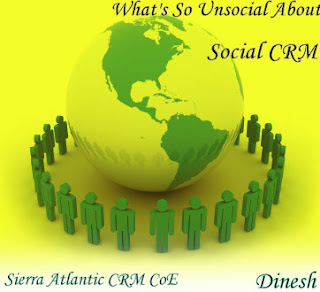
Dears,
Today, everything is social — social commerce, social business, social CRM. The list goes on and on.
Social CRM is one of the most abused title I've heard in the last 2 years. What's disappointing is that it obscures a completely valid concept for helping businesses better understand their customers. Sure, it's a way for software vendors to attempt to explain or differentiate themselves using the latest buzzword, "social." Let's set aside the fluff and define what this really means, because there is some real value here that shouldn't be overlooked.To a business owner, customer relationships are core to just about everything. CRM technologies are tools to help facilitate interactions with our customers. We need these tools so we, as an organization, can be better equipped to sell to and support our customers.
Today there are new ways to interact and engage with customers and prospects — online communities and social networking sites. But it's important we make a distinction here: There are social networks and there are communities. The two are not mutually exclusive, nor are they identical.
Social Networks — Facebook, Twitter, and other similar online properties are designed to facilitate social interactions between people. For example, on Facebook you connect with friends, people you knew in school, and possibly even some coworkers. You may connect with some customers you know, too, but only as a nonwork-related relationship.
Online Communities — Many of the concepts found in social networks such as Facebook and Twitter apply here, but for the express purpose of solving specific business goals and objectives. For example, when Dell uses community software to provide support for its customers, the goals are to sell more hardware, reduce costs, and raise awareness of new products. There is some social aspect, but that is not the purpose of that community.
So how do you apply these concepts to managing relationships with your customers?
1. Monitor Social Networks Social networks are important as you manage your customers. You should monitor and watch them for trends and feedback. They are a channel through which your products and services may be discussed. Use social media monitoring tools to keep track of any mentions of your brand, product, or services so that you can properly react or respond to those mentions. In fact, a great strategy here is to respond with a link back to how you are addressing or echoing the feedback in your own community.
2. Offer a Community There are different types of communities that you can run for your customers. In some cases you may run a business community on a social networking site such as Facebook — though one challenge this represents is data management. Data, as you'll quickly learn, is paramount to understanding your customers and their behaviors.
3. Own the Data The data created for and by your customers is critical to understanding them. It is only through the data that you can derive value from your investment in this new customer channel. For example, Cadence integrated its online community with its CRM software, intending not only to use the community as a resource to help learn more about its customers but also to populate its CRM with that customer knowledge.
4. Customer Intelligence If you own the data from your community, there is a new level of depth you can gain from your customer interactions. Customers will populate data about themselves, the products they use, and their successes and frustrations. Once customer analytics become integrated with a CRM system, you can gain substantial intelligence about your customers: what products they own, what questions they've asked, where they've contributed, and which customers are influential — that's another list that goes on and on.
The answer for CRM vendors isn't reflexively adding "social" in front of their offerings. Instead, these vendors — whose solutions already manage rich customer data — should integrate with community platform vendors that provide intelligence and analytics to complement that data.
Then we'll have more than social CRM. We'll have integrated customer intelligence.
Good Luck
Your P&C
DC*

No comments:
Post a Comment